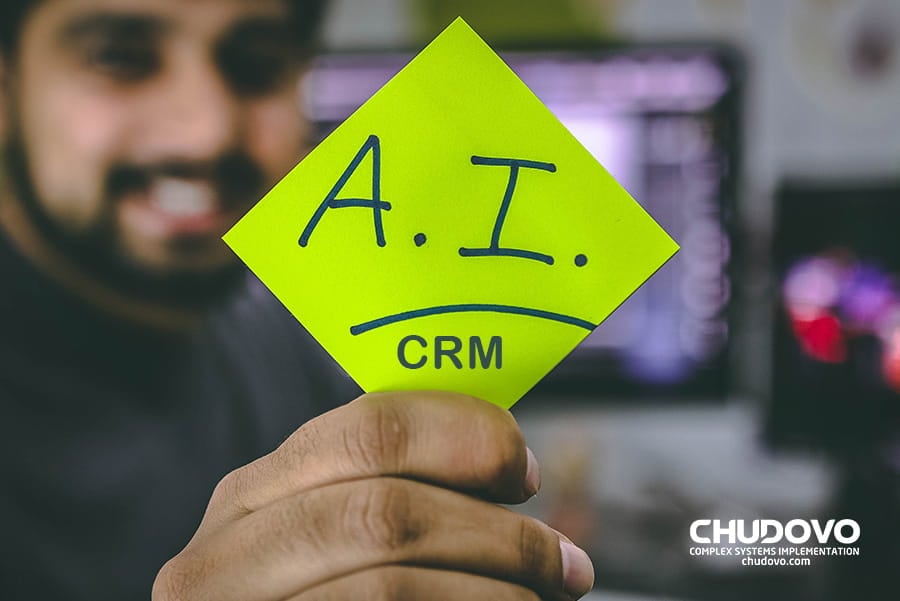Revolutionizing Customer Relations: The Integration of AI in CRM
Within the advancing, fast-paced universe of software development, technical debt consistently emerges as a highly debated topic. Technical debt is one of the most pressing issues in software engineering today, but it’s a concept that can be difficult to grasp.
The power of AI in CRM, or Artificial Intelligence in Customer Relationship Management, has increased manifold in today’s era dominated by the digital business environment. This integration aims to create CRM more innovative, more intuitive, and more effective in establishing excellent customer relationships. All while ensuring the process is simple yet transformative.
Integrating AI in CRM is revolutionary as it’s not just based on a static database but also includes an active assistant. An AI assistant that learns, adapts, predicts, and makes the interactions more accessible and simpler between businesses and customers. This is achievable- thanks to the AI’s analytical ability to make the most out of customer data, forecast trends, personalize experiences and strategise business strategies.
However, this in no way means replacing humans. Relieving staff of routine tasks frees up time for more strategic, relationship-building work. The perks of embracing this way are significant, particularly for early adopters seeking the opportunity to stand out in their respective sectors. But the approach comes with its share of challenges. For instance, integrating AI in CRM is no child’s play. The entire process requires a thorough and strategized planning as well as personalized process.
So, let’s dig deeper to learn more about the revolutionary integration of AI in CRM and how it can be leveraged to yield tangible business results. Whether you’re a small business owner seeking to level up your customer relations strategy, a large enterprise looking to streamline processes, or a tech enthusiast keen on understanding the latest trends in AI and CRM, this article promises a comprehensive read.
Table of Contents

Overview of CRM and AI
Customer Relationship Management, or CRM, is a crucial business strategy focused on managing interactions with current and potential customers. It involves using technology to organize, automate, and synchronize sales, marketing, customer service, and technical support processes.
At its core, CRM is about data – collecting, analyzing, and leveraging it to understand customer behaviour and preferences better. CRM systems have traditionally been viewed as mere contact management tools. But over time, they’ve evolved into complex platforms capable of handling large volumes of customer data, delivering personalized customer experiences, and even integrating with other business systems like ERP (Enterprise Resource Planning).
Artificial Intelligence (AI) has become a reality, reshaping business landscapes worldwide. AI’s capacity to learn, analyze, predict, and automate has found application in many areas, from automating repetitive tasks to making accurate business predictions. AI software development is an ongoing journey, with businesses seeking custom solutions to boost efficiency, improve decision-making, and drive growth.
In particular, AI has showcased massive potential in improving data-driven processes. It’s capable of processing significant amounts of data much faster and more accurately than humans ever could, making it a powerful tool for any data-centric business operation.
The Merging of CRM and AI
The combination of AI and CRM is an organic union of two powerful technologies. The AI in CRM involves embedding AI-based applications into CRM platforms, creating an AI-powered CRM. This AI-enabled system lets businesses thoroughly analyze customer data on an unprecedented scale, derive meaningful insights, and use these insights to enhance customer relations.
AI in CRM transcends the functionality of traditional CRM systems. It’s not just about managing customer contacts but about learning from them and using that learning to offer more personalized and targeted services. For instance, AI is now capable of analyzing customers’ interactions, predicting their purchasing behaviour, and even understanding their social media interactions.
There are companies like Salesforce Inc. that have already started implementing AI-powered CRM systems to increase their sales and make their customer services more effective. While this revolutionary approach can be a challenge, it can bring about successful businesses when done strategically.

CRM Before AI Integration
Before the advent of AI in CRM, traditional Customer Relationship Management (CRM) platforms acted as the linchpin for businesses in crafting customer engagement strategies. But, these systems had their share of drawbacks. At present, the progression of CRM has been a continual evolution of enhancements and breakthroughs, proving to be of significant importance in overcoming these challenges.
Traditional CRM System
To begin with, the pioneering CRM platforms solely solved the purpose of a database to record the contact information of the customers and any interaction history that took place. This made managing customer data easier, increasing the sales process and tracking potential leads.
However, traditional CRM platforms could not increase the volume and complexity of customer data and records. Also, as the process included manual inputs, the platforms were not efficient at making the customer experience personalized and predicting customer behaviour.
The other disadvantage of the traditional CRM is that it was not designed to integrate with business processes such as ERP. This meant that the customer data wasn’t always readily available across the entire business, interrupting the smooth flow of information and hampering efforts to provide seamless customer experiences.
Evolution of CRM
With new advancements in CRM platforms, the drawbacks of traditional platforms are improving. Many advanced features have been added, such as streamlined automation, precise personalization, and integration with other business systems. The beginning of cloud technology was a remarkable milestone, allowing businesses to access CRM systems from anywhere, improve data sharing across different departments, and provide real-time customer interactions.
With time, CRM Software Development platforms have become more sophisticated, with custom solutions designed to meet specific business needs. As businesses realised the power of data-driven decision-making, CRM systems focused more on data analysis capabilities. This allowed businesses to understand customer behaviour better and strategise their sales and marketing strategies.
Even then, these systems could collect and analyze data. They also lacked the predictive capabilities and advanced analytical tools we have in AI-powered CRM today. Integrating artificial intelligence in CRM represents the next giant leap in this evolution.

The Role of AI in Modern CRM
The groundbreaking Artificial Intelligence (AI) has emerged in several industry sectors, exponentially influencing their operational practices, strategies, and outcomes. One of the essential areas where AI has carved out an imperative role is Customer Relationship Management (CRM).
With the infusion of AI, CRM has undergone a drastic transformation that has streamlined business operations and elevated customer interactions. AI brings to CRM a whole new dimension of intelligence and automation- thanks to its ability to analyze massive volumes of data, pinpoint patterns, and strategize actionable insights.
This allows businesses to understand their customers and behaviour better while predicting and personalizing their needs and wants. This significantly improves customer satisfaction and increases efficiency within the organization. One example is freeing staff to focus on more complex and strategic activities. It can also provide real-time insights that help businesses make quicker, data-driven decisions.
That’s not all! With the remarkable ability to learn and adapt over time, AI refines its understanding of customer behaviours and preferences. This is a boon to businesses as it allows them to stay ahead of customer expectations and market trends. No wonder AI has been such an essential aspect of modern CRM.
AI in CRM involves incorporating AI technologies into CRM platforms, creating an AI-powered CRM system. AI bridges the gap between data and actionable insights, allowing businesses to leverage customer data more effectively. Moreover, AI-based CRM systems offer features that can massively improve customer relations, from personalized marketing campaigns to improve customer service.
Types of AI Used in CRM
Several kinds of AI integration in CRM with their perks make them different from others. Let’s look at some of the most common types of AI used in CRM.
- Chatbots
AI-enabled chatbots are revolutionizing customer service, acting as the first line of interaction between businesses and their customers. They are programmed to understand and respond to customer queries instantly and accurately, providing information, resolving issues, or guiding customers through processes as needed.
- Machine Learning
A key strength of machine learning is its predictive ability. Using historical data, machine learning algorithms can accurately forecast future behaviours or trends, such as a customer’s likelihood to purchase a product or respond to a certain type of marketing message. These predictions can then inform business strategies and decision-making, ensuring actions are data-driven and optimized for the best possible outcomes.
- Predictive Analytics
AI-powered predictive analytics tools can analyze large volumes of data and predict future outcomes, such as customer purchasing behaviour, helping businesses make proactive decisions. With these insights, businesses can adopt a proactive rather than reactive stance. For example, they can personalize marketing campaigns for customers who are predicted to be interested in certain products or offer exclusive discounts to those who may be at risk of churn.
How AI Enhances CRM Capabilities
- Data Analysis
AI is designed and built to process massive amounts of customer data quickly and accurately, providing businesses with valuable insights and enabling them to make data-driven decisions.
- Customer Service
AI-powered CRM platforms can enhance customer service by providing personalized responses, resolving issues promptly, and ensuring round-the-clock customer support.
- Sales and Marketing
AI can help businesses optimize their sales and marketing strategies by predicting customer behaviour and preferences, allowing them to target their campaigns more effectively. Integration and Automation: AI can automate routine tasks and integrate them with other business systems, improving efficiency and reducing manual work.

Advantages of AI Integration in CRM
Integrating AI into CRM platforms is revolutionising how businesses manage customer relationships. AI-powered CRM solutions offer significant advantages over traditional CRM systems by automating tasks, providing valuable insights, and personalizing customer interactions.
Improved Customer Experience
The application of AI in CRM allows for a more personalized, responsive, and engaging customer experience. By analyzing customer data, AI can help predict customer needs, provide personalized recommendations, and ensure prompt and efficient customer service. This level of personalization enhances customer satisfaction and can foster stronger customer relationships. For instance, AI-powered chatbots can handle customer queries instantly, around the clock, ensuring customers get the support they need when needed.
Efficient Data Analysis
AI can process and analyze vast amounts of data far more efficiently than humans. By integrating AI into CRM systems, businesses can leverage this power to gain deep insights into customer behaviours, preferences, and trends. This goes beyond simple data collection – AI can spot patterns, predict future behaviours, and provide actionable insights that businesses can use to enhance their strategies and decision-making processes.
Enhanced Sales and Marketing Strategies
By providing detailed insights into customer behaviour, AI-based CRM systems can significantly enhance sales and marketing strategies. For instance, predictive analytics can forecast which customers are most likely to purchase, helping sales teams target their efforts more effectively. Likewise, marketing teams can use AI to tailor their campaigns to individual customers, boosting engagement and conversion rates.
Cost Reduction and Time Efficiency
AI-powered CRM can automate many routine tasks, reducing the need for manual effort and freeing staff to focus on more strategic activities. This not only saves time but also reduces operational costs. Additionally, by providing real-time insights and enabling quicker, data-driven decisions, AI can help businesses to operate more efficiently and effectively.
Challenges of AI Integration in CRM
While the integration of AI in CRM comes with many benefits, there are some limitations of AI Integration in CRM. Some of the challenges of AI Integration in CRM are mentioned below.
Data Privacy and Security Concerns
With AI’s ability to analyze and process large amounts of data, data privacy and security become significant concerns. The vast pools of customer data that AI relies on to function effectively can become a target for cybercriminals. Companies need to invest in robust data security measures to protect this sensitive information and ensure they comply with data privacy regulations. Failure to do so can lead to serious legal repercussions and damage to the company’s reputation.
Implementation Challenges
Implementing AI in CRM can be a complex process that requires significant time, resources, and expertise. Businesses must first identify their needs and set clear objectives for their AI implementation. They must also ensure they have the right infrastructure in place to support the AI technology and train their staff to use it effectively. Without careful planning and management, the integration process can be fraught with difficulties and delays.
The Risk of Over-reliance on AI
While AI offers many benefits, over-reliance on this technology can pose a risk. It’s essential to remember that AI is a tool to aid human decision-making, not replace it. AI can provide valuable insights, but these should be used in conjunction with human judgment and expertise. Over-reliance on AI could lead to a lack of critical human input and potential misinterpretation of AI-generated insights.

Certified engineers
Convenient rates
Fast start
Profitable conditions
Agreement with
EU company
English and German
speaking engineers
The Future of AI in CRM
The integration of Artificial Intelligence (AI) with Customer Relationship Management (CRM) systems marks a fascinating frontier in the business tech landscape. As this field continues to advance, the nature of business-customer interactions and the way businesses leverage customer data are changing dramatically.
AI’s increasing sophistication and accessibility are redefining the very structure of CRM platforms. AI technologies such as machine learning, natural language processing, and predictive analytics are making it possible to derive more nuanced and actionable insights from customer data. These insights can guide the development of personalized customer engagement strategies, enhance customer service, and ultimately, drive sales and customer retention.
Additionally, the dynamic nature of AI in CRM is manifested in the form of various new features being added to CRM platforms. From AI-powered chatbots that offer round-the-clock customer support to intelligent systems that automate repetitive tasks, AI is adding value at multiple levels. It’s also fostering the development of low-code and no-code CRM systems, making it easier for businesses to customize their CRM platforms to fit their unique needs and workflows.
Predictions for the Evolution of AI-Integrated CRM
Looking forward, the integration of AI in CRM is likely to become even more prevalent. As AI becomes more deeply embedded in CRM systems, businesses of all sizes will be able to leverage AI to enhance their customer relationships and drive growth. One prediction is that AI will become an essential tool for CRM data analysis. AI’s ability to analyze large volumes of data quickly and accurately will allow businesses to make data-driven decisions in real-time, giving them a competitive edge in the market.
Another prediction is that we’ll see an increase in the use of AI for predictive customer analytics. This will allow businesses to anticipate customer needs and behaviours, enabling them to provide personalized experiences and proactive service. Finally, as businesses become more comfortable with AI technology, we may see a rise in the number of companies developing their own custom AI solutions. This could lead to a new wave of AI software development, with businesses creating bespoke AI tools designed to meet their specific CRM needs.

Conclusion
The Integration of AI and CRM has brought about a significant transformation in how businesses handle their customer relationships. This synergy provides an opportunity to turn each interaction into a well-crafted engagement. By fostering a more tailored and streamlined approach to customer relationship management, the integration of AI in CRM has become a trailblazer, offering extraordinary benefits to both enterprises and their customers.
That said, as businesses embark on their AI journey, it’s crucial to have a comprehensive AI strategy in place, from choosing the right AI-powered CRM platform to ensuring successful implementation and addressing potential challenges head-on. By doing so, businesses can confidently step into the future of AI-integrated CRM and fully harness the transformative power of this groundbreaking technology.
Frequently Asked Questions (FAQs)
How does AI enhance CRM capabilities?
AI enhances CRM capabilities in several ways. It can streamline and automate routine tasks, freeing up time for sales representatives to focus on more complex tasks. AI can also provide data-driven insights to help businesses better understand their customer’s behaviour and preferences. Furthermore, AI can improve customer service by offering personalized experiences and quick, automated responses to queries.
What are the benefits of integrating AI into CRM systems?
Integrating AI into CRM systems can improve customer experience, make data analysis more efficient, enhance sales and marketing strategies, and provide time and cost efficiency. It allows businesses to personalize their customer interactions based on predictive analytics and machine learning models, which can lead to increased customer satisfaction and loyalty.
How does AI-powered CRM contribute to sales and marketing strategies?
AI-powered CRM can significantly enhance sales and marketing strategies by providing valuable insights from customer data. It can predict customer behaviour, identify patterns, and reveal sales opportunities. It can also automate routine tasks like customer segmentation and lead scoring, enabling the sales team to focus on developing personalized sales strategies.
Are there any challenges or risks involved in integrating AI into CRM?
While AI integration brings many benefits, there are also potential challenges and risks. These include data privacy and security concerns, as AI systems require access to a vast amount of sensitive customer data. There can also be implementation challenges, especially for businesses that lack the technical expertise to effectively utilize AI technologies. Lastly, there is a risk of over-reliance on AI, which could lead to a lack of human oversight or intervention when needed.
Can small businesses also benefit from AI-integrated CRM systems?
Absolutely. Small businesses can greatly benefit from AI-integrated CRM systems. By automating routine tasks, AI can help small businesses optimize their limited resources. The predictive analytics capabilities of AI can also provide valuable insights into customer behaviour, helping small businesses to better target their marketing efforts and improve customer relations.




